Overview
Understanding the stages of Alzheimer’s disease is crucial for families and caregivers. It allows them to anticipate changes, plan for future care needs, and provide tailored support that can significantly enhance the quality of life for those affected. This article outlines the progression of Alzheimer’s through various stages, emphasizing the importance of recognizing symptoms early. By adopting proactive caregiving strategies, caregivers can effectively manage challenges and create a supportive environment. Remember, we’re here for you in this journey.
Introduction
As the prevalence of Alzheimer’s disease continues to rise, impacting millions of individuals and their families, understanding the intricacies of its progression becomes essential. This progressive neurodegenerative disorder affects not only memory and cognitive function but also presents significant challenges for caregivers who strive to offer the best support possible. By exploring the various stages of Alzheimer’s, families can better anticipate changes, tailor their care strategies, and enhance the quality of life for their loved ones.
In addition, insights from experts and real-world case studies illuminate the stages of Alzheimer’s disease, highlighting the importance of early recognition, proactive caregiving, and the vital role of professional support services. We understand that navigating this complex journey can feel overwhelming, but together, we can ensure that your loved ones receive the compassionate care they deserve. Remember, you are not alone in this; we are here for you.
Overview of Alzheimer’s Disease: Importance of Understanding Stages
Alzheimer’s disease is a progressive neurodegenerative disorder that primarily impacts memory, thinking, and behavior, representing 60-70% of all dementia cases. As the prevalence of Alzheimer’s continues to rise, with nearly 6 million Americans currently living with the disease, understanding its stages becomes increasingly crucial for families and caregivers. This knowledge empowers them to anticipate changes, plan for future care needs, and provide tailored support.
According to the Who’s Global Status Report on dementia released in 2020, the global response to dementia remains inadequate, highlighting the urgency of addressing this growing public health challenge.
Recognizing the symptoms associated with Alzheimer’s stages can facilitate earlier interventions and improve disease management. For instance, individuals with less than a high school education are 30% more prone to experiencing mild cognitive impairment, underscoring the necessity for focused awareness and resources. Experts emphasize that understanding Alzheimer’s stages is essential for improving brain health equity.
As noted by Jennifer J. Manly, a leading neuropsychologist, “If we’re interested in increasing brain health equity in later life, we need to know where we stand now and where to direct our resources.”
The impact of Alzheimer’s on memory and behavior can be profound, affecting not only the individual but also their families. Without the assistance of CNA/HHA aide services, seniors may encounter considerable dangers, including:
- Health deterioration due to lack of medical oversight
- Poor nutrition from insufficient meal preparation
- Heightened social isolation, which can lead to depression and anxiety
Furthermore, the inability to manage household tasks can create hazards in the living environment, increasing the risk of accidents.
Real-world examples illustrate how families navigate the complexities of caregiving through various stages of the disease, often facing emotional and logistical challenges. Case studies reveal that in high-income countries, only 20-50% of dementia cases are recognized, with a staggering 90% remaining undiagnosed in lower-income regions. This treatment gap emphasizes the essential requirement for heightened awareness and resources to aid early diagnosis and intervention.
As families and caregivers strive to provide the best possible care, understanding Alzheimer’s stages is paramount. It equips them with the knowledge to manage symptoms effectively and fosters a supportive environment that enhances the quality of life for both patients and their loved ones. Professional caregiving from Best Care Nurses Registry not only addresses essential needs such as personal hygiene and medication management but also provides emotional support, creating a safer and more organized living environment for seniors.
This comprehensive approach is vital for maintaining independence and dignity in the face of cognitive decline.
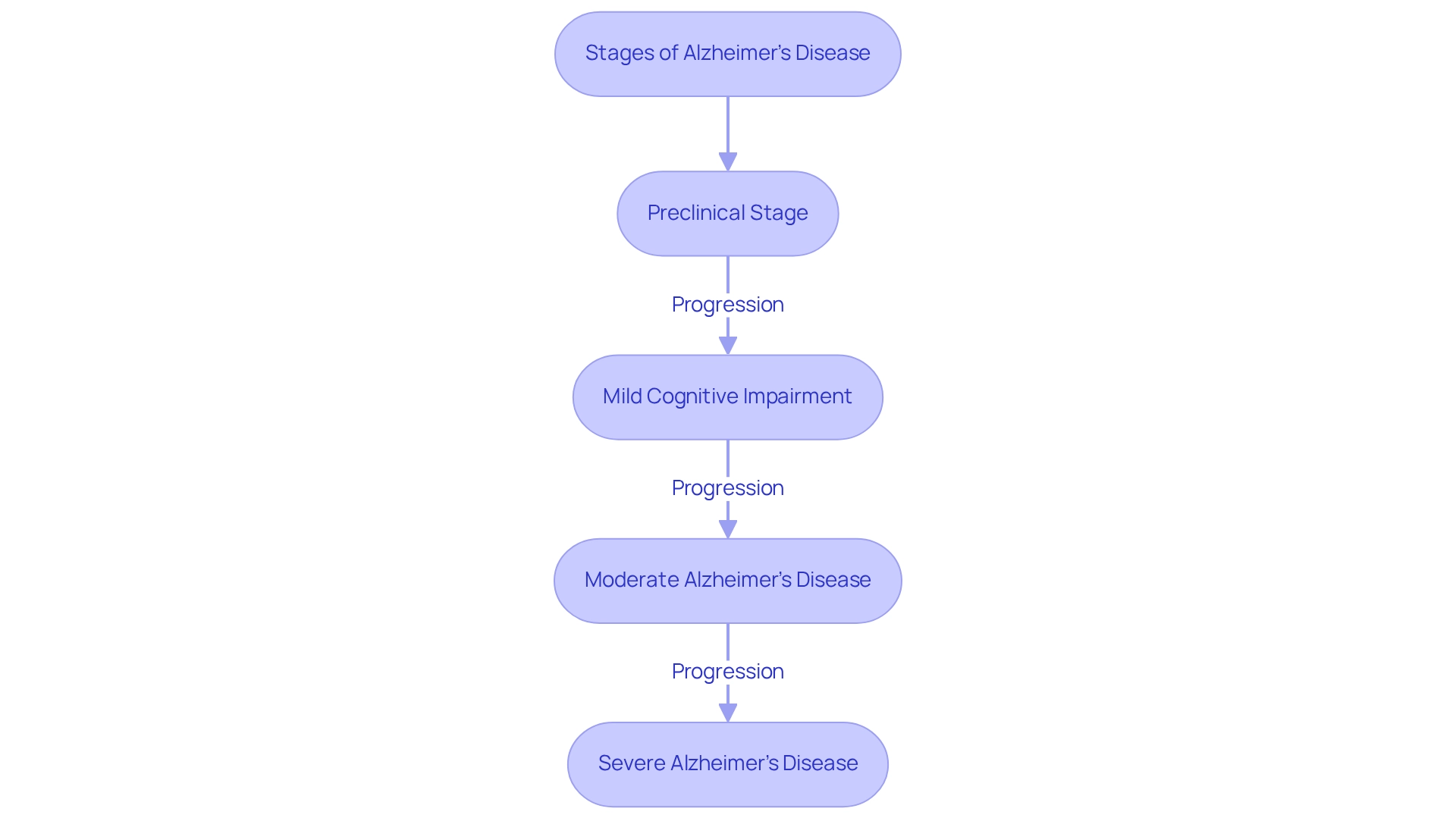
Stage 1: Preclinical Alzheimer’s Disease – Recognizing Early Signs
In the preclinical phase of Alzheimer’s stages, individuals often do not show obvious symptoms. However, significant changes in the brain can occur years before cognitive decline becomes evident. Early indicators may manifest as subtle memory lapses, such as forgetting recent conversations or struggling to find the right words during discussions. Families should remain vigilant for these changes, as recognizing them early can lead to crucial conversations with healthcare providers regarding potential assessments and interventions.
Regular cognitive evaluations are essential for monitoring any shifts in cognitive function over time, particularly in relation to Alzheimer’s stages. Statistics reveal that many individuals may experience these early signs without being aware of their implications. For instance, studies indicate that nearly 15% of adults aged 65 and older exhibit some form of cognitive impairment, often linked to preclinical Alzheimer’s disease. This prevalence emphasizes the importance for families to be proactive in their observations, especially given the focus on earlier diagnosis and early intervention related to Alzheimer’s stages highlighted in the World Alzheimer Report 2011.
Consider the case of Will, who advocated for young carers after his mother’s dementia diagnosis. His experience illustrates the challenges families encounter while dealing with the intricacies of cognitive decline, stressing the necessity for advocacy and support to aid those providing care. Will’s advocacy work sheds light on the emotional and practical difficulties encountered by young carers, reinforcing the importance of community support. By understanding the subtle memory lapses associated with preclinical Alzheimer’s disease and its subsequent Alzheimer’s stages, families can better prepare for discussions with healthcare professionals, ensuring timely interventions that may help manage the progression of the disease.
Additionally, resources such as infographics on Alzheimer’s Disease and discussions on memory myths can provide families with further tools to recognize early signs and understand the condition more comprehensively. Furthermore, with the assistance of Best Care Nurses Registry, families can access personalized care solutions that reduce stress and ensure the safety of their loved ones. This enables caregivers to concentrate on their own well-being and reconnect with family and friends. If you are feeling overwhelmed or worried about your loved one’s safety, please reach out to Best Care Nurses Registry at (888) 203-2529. We’re here for you to discuss your needs and schedule a call for personalized support.
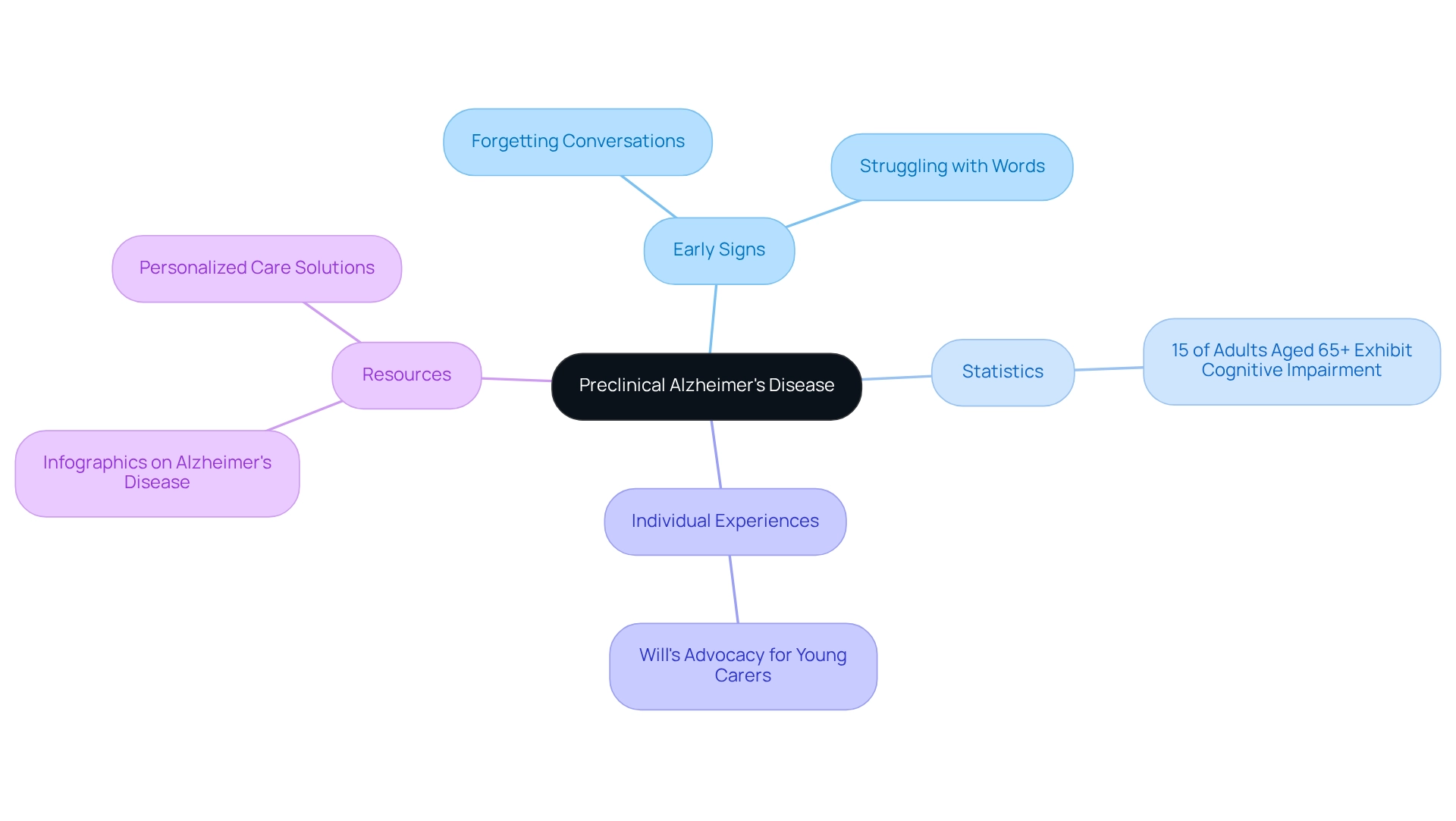
Stage 2: Very Mild Cognitive Impairment – Common Forgetfulness
In the early stages of Alzheimer’s, many individuals experience typical forgetfulness, like misplacing items or struggling to remember names. While these lapses can often be attributed to normal aging, they may also signal the onset of cognitive impairment. Research shows that nearly 15% of seniors face mild cognitive impairment, which can manifest through these subtle memory issues.
Moreover, around 20% of elderly individuals encounter mobility restrictions, which can impede their autonomy and daily tasks, adding to the challenges faced by caregivers.
Caregivers play a crucial role in addressing these changes; fostering open communication about forgetfulness is essential. Dr. Reisberg emphasizes, “If you are experiencing memory complaints, it is more important than ever to have honest conversations with your physician so he or she can monitor your symptoms and offer treatment therapies if applicable.” Encouraging individuals to share their experiences helps normalize these discussions and reduces feelings of isolation.
If forgetfulness becomes more frequent or concerning, it may be wise to seek professional evaluations. Keeping a detailed journal of observed changes can facilitate productive conversations with healthcare providers, ensuring that any potential cognitive decline is monitored effectively. Additionally, it is important to consider the broader context of seniors’ lives, as nearly 10% of older adults were living below the official poverty line in 2022, and many faced food insecurity.
Real-life instances demonstrate how providers from Best Care Nurses Registry can assist their loved ones through these challenges, highlighting the significance of patience and understanding. By recognizing the distinction between typical aging and cognitive decline, families can take proactive measures to ensure their loved ones receive suitable assistance and support during the Alzheimer’s stages.
Indicators suggesting the need for CNA/HHA support services include:
- Difficulty with personal hygiene
- Dressing
- Cooking
- Cleaning
- Managing medications
CNAs (Certified Nursing Assistants) undergo thorough training focused on medical tasks, while HHAs (Home Health Aides) are educated in personal assistance and daily living activities. With tailored home support services, caregivers can aid with daily living tasks, offer companionship to reduce risks of isolation, and assist in managing health issues, ultimately improving the quality of life and independence for seniors.
If you are feeling overwhelmed or concerned about your loved one’s well-being, we invite you to contact Best Care Nurses Registry today. Together, we can discuss your needs and explore personalized care solutions that prioritize your comfort and peace of mind.
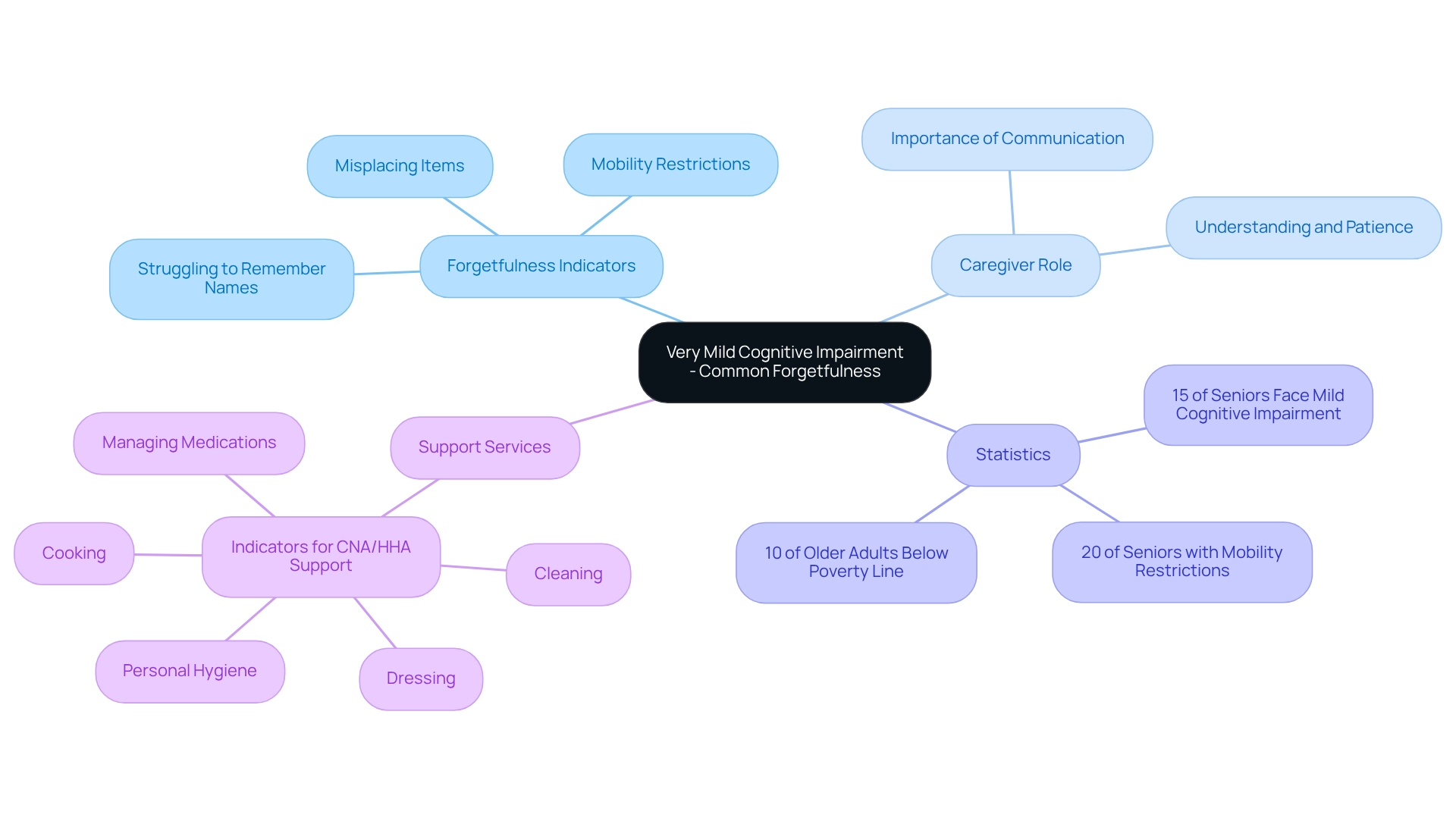
Stage 3: Mild Cognitive Decline – Navigating Everyday Challenges
During the mild cognitive decline stage, one of the Alzheimer’s stages, individuals often encounter challenges with planning and organization, such as managing finances or following recipes. Caregivers, including Certified Nursing Assistants (CNAs) and Home Health Aides (HHAs), play a vital role in this phase. By establishing structured routines and simplifying daily tasks, they can help reduce frustration. These dedicated attendants provide essential support with daily living tasks, ensuring that individuals can maintain their independence while receiving the assistance they need.
Employing reminders—whether through calendars, mobile applications, or visual prompts—can significantly help individuals manage their activities effectively. Encouraging social interactions is crucial; maintaining connections with family and friends can enhance emotional well-being and cognitive function. Engaging in cognitive activities like puzzles, reading, or memory games can also stimulate the mind and help slow cognitive decline.
Statistics reveal that approximately three-quarters of people with dementia worldwide may not have received a diagnosis. This underscores the importance of proactive caregiving and early intervention. For instance, caregivers can assist in planning and organization by creating checklists for daily activities or establishing reminders for important events.
Research shows that effective support systems, including companion and sitter services, can greatly enhance the quality of life for individuals facing mild cognitive decline. The rising incidence of Alzheimer’s disease has led to a pressing need for skilled direct support workers. Reports suggest that over 1 million additional direct support personnel will be required by 2031 to meet this demand. By implementing these strategies, caregivers can alleviate everyday challenges while fostering a supportive environment that encourages independence and engagement.
Moreover, the financial impact of dementia assistance, which has surpassed US$ 1.3 trillion worldwide, highlights the urgent need for comprehensive support frameworks. By recognizing these factors, caregivers can better navigate the complexities of mild cognitive decline and provide essential support through personalized home health care services.
We’re here for you—call (888) 203-2529 to schedule a conversation and discuss your needs with Best Care Nurses Registry, where flexible service options are available to cater to your loved one’s unique requirements.
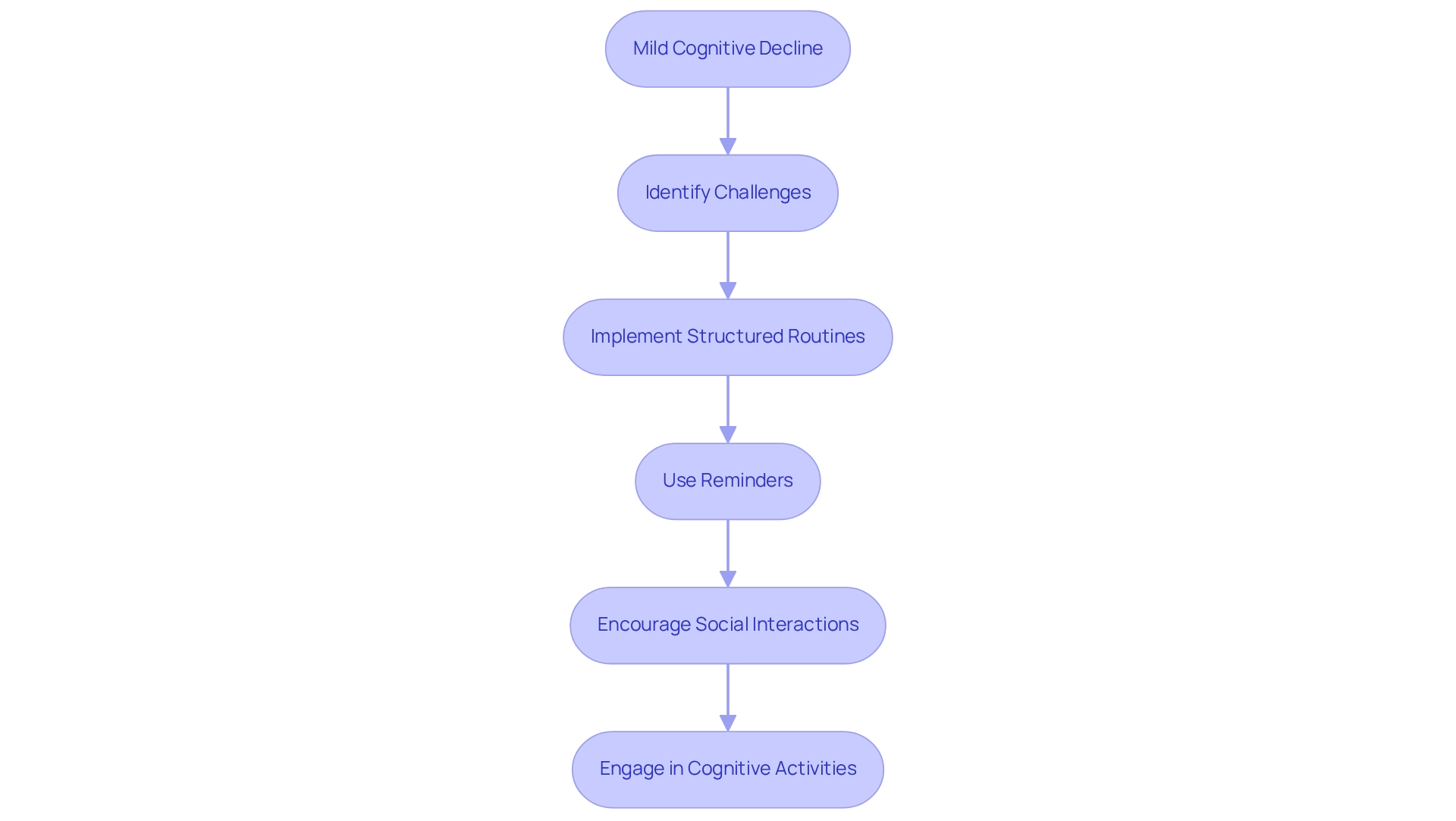
Stage 4: Mild Alzheimer’s Disease – Understanding Moderate Decline
At this phase of Alzheimer’s stages, individuals often experience significant changes in behavior and cognition. Common symptoms include increased forgetfulness, confusion about time and place, and difficulties with complex tasks. Families should be prepared for emotional fluctuations, which can vary widely among individuals.
Research shows that behavioral symptoms, especially in the early stages of Alzheimer’s, can greatly affect daily activities, highlighting the need for a personalized approach to care. Notably, individuals in stage 2 of Alzheimer’s decline at a rate of -0.32, while those in stage 3 decline at -1.06, and in stage 4+ at -1.93. This progression emphasizes the disease’s impact on daily functioning.
To effectively support loved ones, caregivers—such as CNAs and HHAs from Best Care Nurses Registry—play a vital role. They can adapt their communication styles, using clear and simple language while exercising patience. Creating a calm and structured environment is essential, as it can help reduce anxiety and confusion.
Encouraging social connections and participation in familiar activities not only fosters a sense of normalcy but also enhances emotional well-being. The prevalence of behavioral and psychological symptoms of dementia (BPSD) across the various Alzheimer’s stages underscores the importance of assessing these symptoms in caregiving strategies.
Real-world examples illustrate how families navigate these challenges. For instance, many families have found success in establishing routines that incorporate familiar tasks, helping individuals maintain a sense of independence. CNAs and HHAs assist with daily living activities such as bathing, dressing, meal preparation, and medication reminders, ensuring that individuals receive the support they need.
Furthermore, understanding the variability in personal decline rates, particularly concerning Alzheimer’s stages—emphasized in the case study ‘Variability in IADL Decline Among People’—can help families set realistic expectations and adjust their caregiving strategies accordingly. As noted by Sietske A. M. Sikkes, who designed and supervised the study, integrating research findings into caregiving practices is crucial. By focusing on emotional care and effective communication, families can navigate the complexities of moderate cognitive decline with greater confidence and compassion, supported by the dedicated assistance of CNAs and HHAs.
Best Care Nurses Registry offers CNAs and HHAs for hourly services with no minimum requirement. To discuss your needs and schedule a call, please contact us at (888) 203-2529.
Stage 5: Moderate Dementia – Recognizing the Need for Assistance
In the moderate stages of Alzheimer’s, individuals often face significant challenges with daily activities such as dressing, bathing, and meal preparation. It’s important to recognize that approximately 75% of people with dementia have not received a formal diagnosis, which complicates the understanding of their support needs. Caregivers are encouraged to proactively assess the level of assistance required, as many individuals with moderate dementia may depend on daily support to maintain their quality of life.
Establishing a consistent daily routine can offer much-needed structure and comfort for those affected. This routine not only helps individuals feel more secure but also aids caregivers in managing their responsibilities effectively. Safety within the home environment is crucial; by removing potential hazards and utilizing assistive devices, the risk of accidents can be significantly reduced.
For instance, installing grab bars in bathrooms and ensuring adequate lighting can greatly enhance safety.
Caregivers must also nurture patience and understanding, as feelings of frustration can arise during this stage. Expert insights highlight the importance of recognizing when professional help is necessary. Many caregivers report feeling overwhelmed, underscoring the need for comprehensive support programs that address both their challenges and the rewarding aspects of caregiving.
CNA (Certified Nursing Assistants) and HHA (Home Health Aides) services can provide invaluable support, including assistance with personal hygiene, meal preparation, and medication management—essential elements for maintaining health and preventing complications.
Statistics indicate that a significant number of individuals with moderate dementia require daily assistance, emphasizing the importance of recognizing these needs early. As one expert noted, “Cost is a barrier for lots of people. You know, there’s a limit to how much home assistance they utilize because of the cost.” By identifying the signs that suggest a need for help, caregivers can more effectively support their loved ones and ensure they receive the care they deserve.
Furthermore, maintaining open communication with caregivers and the home assistance agency is vital for ensuring quality support. Resources such as Benefits.gov can provide information on federal benefits related to care and assistance for individuals with dementia. As the landscape of caregiving evolves, staying informed about available resources and support options is essential for families navigating the complexities of moderate dementia.
For additional details or to arrange nursing services, please reach out to Best Care Nurses Registry at (888) 203-2529. Remember, we’re here for you, and your comfort is our priority.
Stage 6: Moderately Severe Alzheimer’s – Coping with Advanced Symptoms
During the moderately severe stages of Alzheimer’s, individuals often experience profound memory loss, confusion, and difficulty recognizing familiar faces, including those of loved ones. This stage may also lead to changes in sleep patterns and increased anxiety, which can be distressing for both patients and their caregivers. At Best Care Nurses Registry, we understand these challenges, and we prioritize providing comfort and reassurance through our personalized home health care services.
Utilizing familiar objects and maintaining established routines can help ground individuals, fostering a sense of security amidst the confusion. Our compassionate support staff, including Certified Nursing Assistants (CNAs) and Home Health Aides (HHAs), are trained to assist with daily living activities while also offering emotional support. Engaging in simple, enjoyable activities, such as listening to music or looking through photo albums, can create emotional connections and alleviate feelings of agitation.
These activities not only stimulate positive memories but also serve as a comforting presence in the lives of those affected.
It is vital for caregivers to acknowledge the importance of their own well-being during this challenging time. Research indicates that full-time caregivers often report poorer physical health compared to non-caregivers, with a Physical Health Index (PHI) score of 77.4% versus 83.0%. As Bruce R. Reed, PhD, observes, “The attention you provide to yourself is the attention you provide to your loved one.”
This highlights the necessity for caregivers to seek support from their social circles, as many rely on family and friends for assistance and emotional encouragement. Strengthening these connections can significantly enhance the well-being of caregivers, enabling them to provide better support to their loved ones.
As caregivers assist individuals with advanced Alzheimer’s, they should also recognize that some patients may live for 20 years or longer after diagnosis. This long journey underscores the need for ongoing strategies to cope with the evolving symptoms associated with Alzheimer’s stages. Additionally, caregivers should consider hospice services, which provide support for individuals at the end of life, including pain management and home care.
By focusing on comfort and connection, and recognizing the importance of community support, caregivers can help improve the quality of life for both themselves and their loved ones during this challenging stage.
At Best Care Nurses Registry, we also offer pet-friendly services to ensure that your loved ones can enjoy the companionship of their furry friends during this time. Call (888) 203-2529 to schedule a consultation and discuss your needs. Our dedicated team is here to support you every step of the way.
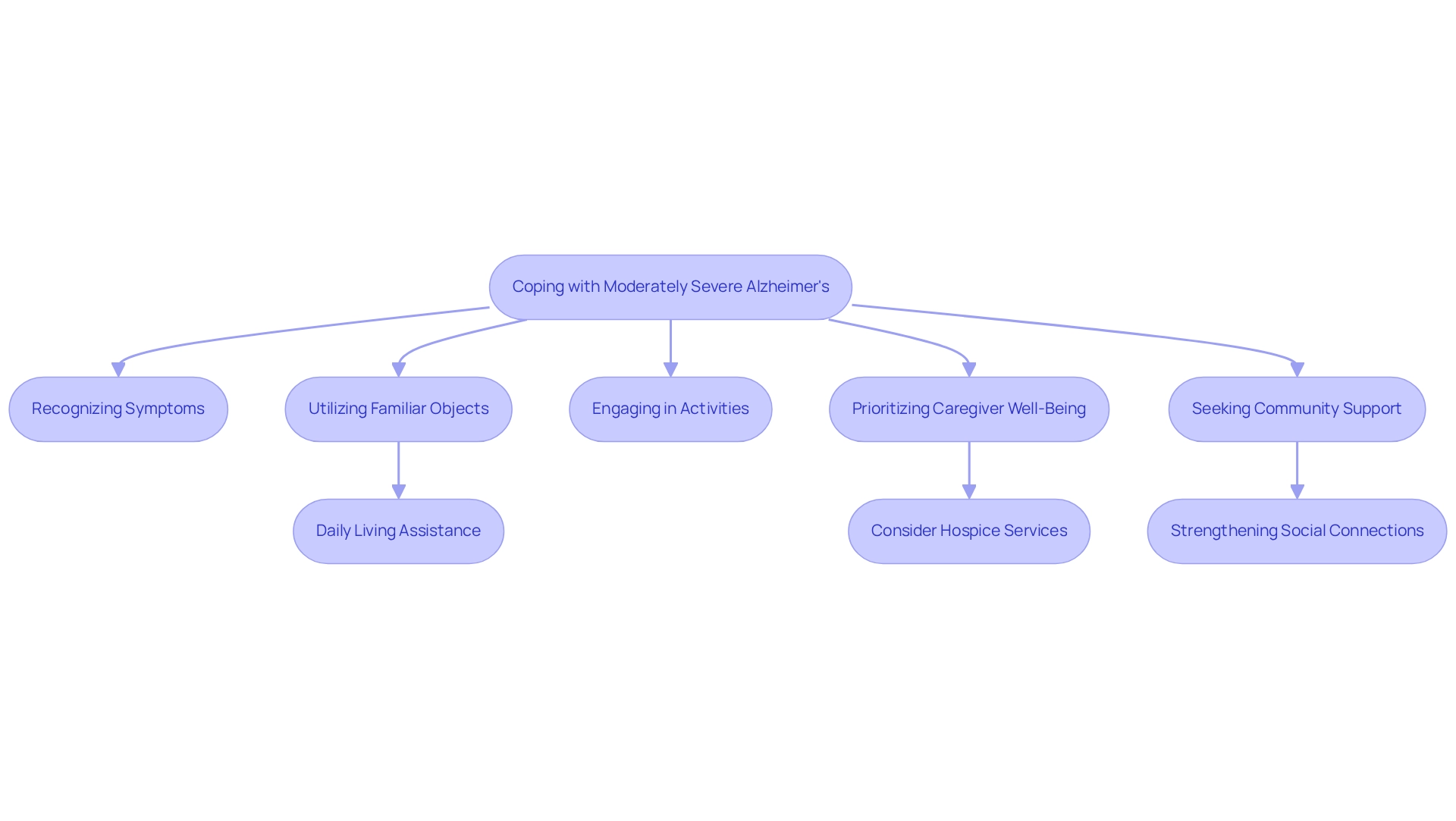
Stage 7: Severe Alzheimer’s Disease – Preparing for the Final Stages
In the advanced stages of Alzheimer’s disease, individuals often experience significant communication loss and require extensive personal assistance. At this critical juncture, it is essential for families to prioritize comfort and dignity. Early discussions about end-of-life wishes are vital, allowing the individual’s preferences to be honored and respected.
Engaging in these conversations can foster a sense of control for the patient, even as cognitive abilities decline.
Palliative options are crucial in managing symptoms and enhancing the quality of life for those in the later stages of Alzheimer’s. These services focus on alleviating discomfort and addressing emotional and psychological needs, ensuring that patients receive compassionate support tailored to their unique circumstances. For example, adapting nutritional needs is essential, as individuals may struggle with eating and drinking, which can lead to complications such as choking or infections.
Support services, like those provided by Best Care Nurses Registry, can significantly enhance the quality of life for seniors by offering personalized assistance that meets their specific requirements.
Statistics reveal that 42 supporters (79.2%) felt knowledgeable about end-of-life options and resources available for their partner, highlighting the importance of provider education and awareness in these conversations. Support groups and counseling can also serve as invaluable resources for families navigating grief and loss during this time. These platforms create a space for caregivers to share experiences and seek guidance, helping them cope with the emotional toll of caring for others.
Understanding the unique needs of both caregivers and individuals experiencing dementia during the end-of-life phase is vital for improving service provision, as recent research underscores. As families prepare for this challenging journey, it is important to explore various perspectives on end-of-life support experiences and identify barriers to accessing quality assistance. By fostering open dialogue and emphasizing dignity and comfort, families can ensure that their loved ones receive the compassionate support they deserve in these final stages.
As Kat Helgeson notes, preserving dignity and comfort is essential in managing Alzheimer’s stages, reinforcing the need for a compassionate approach. Furthermore, additional research should explore end-of-life support experiences across different communities to highlight the necessity for greater understanding and accessibility in treatment options.
Understanding the Progression: Timeline and What to Expect
Alzheimer’s disease typically progresses through several stages over a period of 8 to 10 years, although individual experiences may vary widely. Understanding this progression timeline is essential for families, as it enables them to foresee changes and prepare for future support needs. Regular meetings with healthcare professionals are crucial for tracking the disease’s progression and adjusting treatment plans accordingly.
Studies suggest that nearly three-quarters of people with dementia have not obtained an official diagnosis, which can impede timely intervention and assistance. While there is currently no cure for Alzheimer’s disease, various therapies and support services, including tailored home health care from Best Care Nurses Registry, can significantly aid in managing symptoms and improving the quality of life for both patients and their families.
The emotional and psychological effects of Alzheimer’s are profound, impacting not only the individual but also their caregivers. Families often experience increased stress and emotional strain as they navigate the complexities of caregiving. Mood and personality changes in patients can manifest as heightened suspicion, mood swings, agitation, and even hallucinations, further complicating the caregiving experience.
This emotional burden is exacerbated by the fact that many individuals with dementia remain undiagnosed, underscoring the importance of prompt intervention and the role of compassionate support providers in delivering essential assistance.
Understanding the risk factors associated with Alzheimer’s, such as age, genetics, and lifestyle choices—including physical inactivity and poor diet—can empower families to take proactive steps in reducing their loved ones’ likelihood of developing the disease. For instance, awareness of these factors can guide family planning and support strategies, emphasizing the necessity for CNA/HHA services to ensure appropriate medical monitoring and assistance.
Seniors without CNA/HHA services face significant risks, including:
- Health decline due to lack of medical monitoring
- Poor nutrition from inadequate meal preparation
- Hygiene issues leading to infections
- Mobility challenges increasing fall risks
- Social isolation contributing to depression
- Medication mismanagement
As families prepare for the journey ahead, they should anticipate providing continuous assistance with basic activities of daily living, especially during the Alzheimer’s stages of the disease. As Dr. Barry Reisberg notes, at this stage, AD patients require ongoing help with essential daily activities for survival.
This proactive strategy not only aids in managing the practical elements of support but also addresses the emotional needs of both the patient and the caregiver, fostering a compassionate atmosphere during this challenging time.
To engage with Best Care Nurses Registry, families can follow a simple step-by-step process:
- Call to speak with our friendly staff to discuss needs and answer any questions.
- Discuss the situation with the loved one and seek a care plan from their doctor.
- Receive recommendations of compassionate support providers whom families can select to collaborate with.
The involvement of professional caregivers from Best Care Nurses Registry can significantly enhance the quality of life for seniors, providing the necessary support to maintain their dignity and independence.
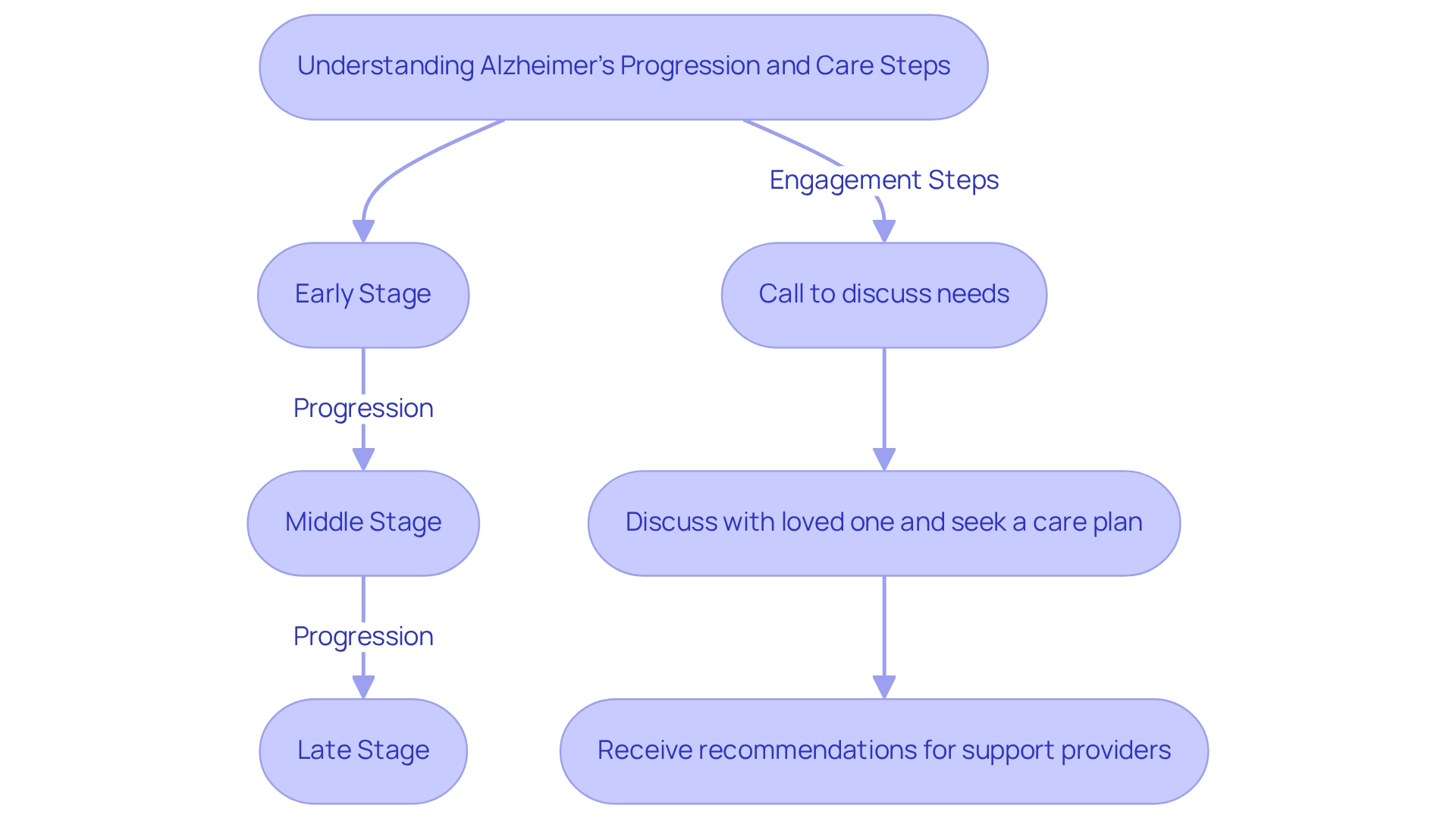
Practical Caregiving Strategies: Supporting Loved Ones at Every Stage
Caregiving for someone with Alzheimer’s requires a flexible and informed approach. Here are practical strategies tailored for each stage of the disease, complemented by the personalized home health care services offered by Best Care Nurses Registry:
- Preclinical Stage: Encourage regular check-ups and cognitive assessments to monitor any changes. Open communication about observed behaviors can help in early detection and intervention. Best Care’s expert staff can assist in creating a care plan that includes these assessments.
In the context of Alzheimer’s stages, very mild cognitive impairment can be managed by utilizing reminders and organizational tools to assist with daily tasks. Creating a supportive environment that fosters independence is crucial during this stage. Our assistants are trained to offer the necessary support while encouraging autonomy.
- Mild Cognitive Decline: Establish consistent routines and simplify tasks to reduce confusion. Engaging in cognitive activities and maintaining social interactions can promote mental engagement and well-being. Best Care’s personalized matching service guarantees that your loved one is connected with a compassionate assistant who understands their unique needs.
- Mild Alzheimer’s Stages: Exercise patience and understanding as emotional fluctuations may occur. Familiar objects and routines can provide comfort and a sense of security for the individual. Our support providers are dedicated to fostering a nurturing atmosphere that improves quality of life.
- Moderate Dementia: Assess the necessity for professional assistance, as this stage of Alzheimer’s frequently demands extra help. Ensuring safety within the home and maintaining a structured daily routine can help manage challenges effectively. Best Care Nurses Registry provides extensive assistance for family supporters, reducing stress and ensuring safety for seniors.
- Moderately Severe Alzheimer’s Stages: It is important to prioritize comfort and reassurance, focusing on simple, enjoyable activities that foster connection and engagement with the individual. Our support providers are trained to offer significant interactions that improve the well-being of your loved one.
- Severe Alzheimer’s Stages: It is crucial to address end-of-life preferences early on and explore palliative treatment options. Offering assistance for both the individual and those who support them is essential to navigate this difficult time, ensuring dignity and empathy in support. Best Care’s customized planning process enables families to develop tailored solutions that fulfill their specific requirements.
Statistics show that approximately one-quarter of individuals in the ‘sandwich generation’ manage the support of elderly parents and children under 18. This emphasizes the necessity for efficient assistance systems for families handling Alzheimer’s management. Additionally, it is important to note that Alzheimer’s disease usually affects people older than 65, underscoring the relevance of these strategies for the target audience.
As one supporter insightfully stated, “The attention you provide to yourself is the attention you offer to your loved one,” highlighting the significance of self-care for those providing assistance throughout the caregiving process. By applying these strategies and utilizing the resources available through Best Care Nurses Registry, caregivers can better support their loved ones throughout the Alzheimer’s stages, ensuring a compassionate and dignified caregiving experience.
To learn more about how Best Care Nurses Registry can assist you, call (888) 203-2529 to speak with our friendly staff and discuss your needs. Our caregivers undergo a thorough screening process to ensure excellence and safety in caregiving, providing you with peace of mind as you navigate this journey.
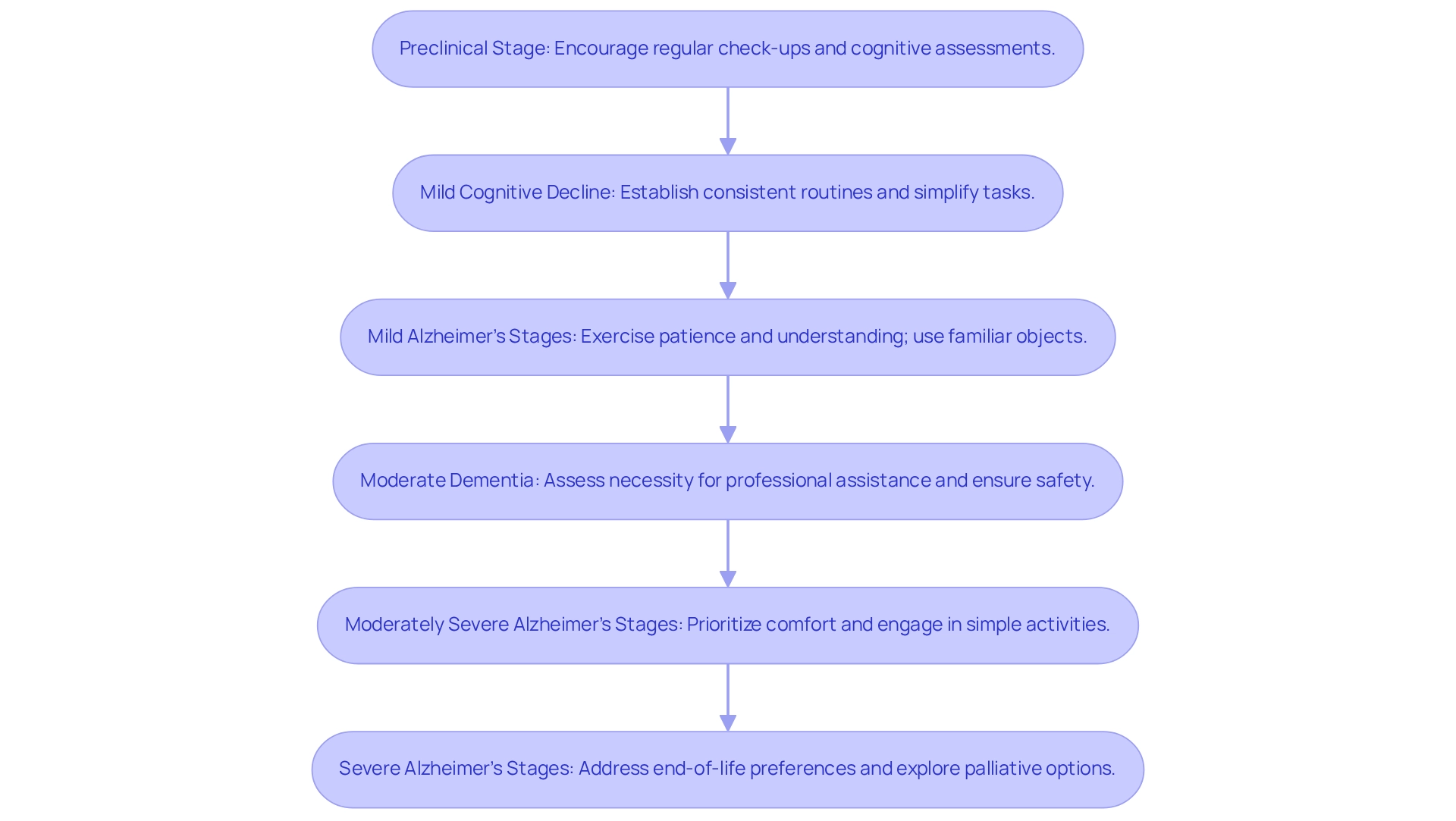
Conclusion
Understanding the stages of Alzheimer’s disease is crucial for families and caregivers navigating the complexities of this progressive condition. Each stage presents unique challenges, from early signs of cognitive decline to the profound impacts of advanced disease. By being informed about the symptoms and care needs associated with these stages, families can better anticipate changes and tailor their caregiving strategies to enhance the quality of life for their loved ones.
The importance of early recognition and proactive intervention cannot be overstated. Timely diagnosis and tailored support services, such as those provided by Best Care Nurses Registry, can significantly improve the management of symptoms and emotional well-being for both patients and caregivers. This journey may be overwhelming; however, understanding the progression of Alzheimer’s allows families to foster a supportive environment that prioritizes dignity and compassion.
As the landscape of caregiving evolves, it is essential for families to engage in open communication, seek professional support, and utilize available resources. By doing so, they can ensure that their loved ones receive the compassionate care they deserve. Ultimately, this transforms a challenging journey into one of connection and understanding. Together, through education and support, families can navigate the complexities of Alzheimer’s disease, ensuring that both patients and caregivers feel valued and supported throughout this difficult process.
Frequently Asked Questions
What is Alzheimer’s disease and its prevalence?
Alzheimer’s disease is a progressive neurodegenerative disorder that primarily affects memory, thinking, and behavior, accounting for 60-70% of all dementia cases. Nearly 6 million Americans are currently living with the disease, and its prevalence continues to rise.
Why is understanding the stages of Alzheimer’s important for families and caregivers?
Understanding the stages of Alzheimer’s is crucial for families and caregivers as it helps them anticipate changes, plan for future care needs, and provide tailored support, ultimately enhancing the quality of life for both patients and their loved ones.
What are the risks associated with a lack of support for seniors with Alzheimer’s?
Without assistance from caregivers, seniors may face health deterioration due to lack of medical oversight, poor nutrition from insufficient meal preparation, heightened social isolation leading to depression and anxiety, and increased risks of accidents due to difficulties managing household tasks.
How prevalent is cognitive impairment in older adults?
Studies indicate that nearly 15% of adults aged 65 and older experience some form of cognitive impairment, often linked to preclinical Alzheimer’s disease.
What are early signs of Alzheimer’s disease?
Early signs of Alzheimer’s may include subtle memory lapses, such as forgetting recent conversations or struggling to find the right words during discussions. In the early stages, individuals may also experience typical forgetfulness, like misplacing items or struggling to remember names.
What role do caregivers play in the management of Alzheimer’s?
Caregivers are essential in addressing changes in memory and behavior. They should foster open communication about forgetfulness, encourage discussions with healthcare providers, and monitor any concerning symptoms to ensure timely interventions.
What services can Certified Nursing Assistants (CNAs) and Home Health Aides (HHAs) provide for seniors with Alzheimer’s?
CNAs can assist with medical tasks, while HHAs provide personal assistance with daily living activities such as personal hygiene, dressing, cooking, cleaning, and managing medications. These services improve the quality of life and independence for seniors.
How can families prepare for discussions with healthcare professionals regarding Alzheimer’s?
Families can keep a detailed journal of observed changes in their loved ones’ behavior and memory, which can facilitate productive conversations with healthcare providers and ensure any potential cognitive decline is monitored effectively.
What should families do if they feel overwhelmed about their loved one’s safety and care?
Families who feel overwhelmed or concerned about their loved one’s well-being are encouraged to contact Best Care Nurses Registry for personalized support and to discuss their specific care needs.











